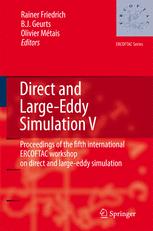

Most ebook files are in PDF format, so you can easily read them using various software such as Foxit Reader or directly on the Google Chrome browser.
Some ebook files are released by publishers in other formats such as .awz, .mobi, .epub, .fb2, etc. You may need to install specific software to read these formats on mobile/PC, such as Calibre.
Please read the tutorial at this link: https://ebookbell.com/faq
We offer FREE conversion to the popular formats you request; however, this may take some time. Therefore, right after payment, please email us, and we will try to provide the service as quickly as possible.
For some exceptional file formats or broken links (if any), please refrain from opening any disputes. Instead, email us first, and we will try to assist within a maximum of 6 hours.
EbookBell Team

4.3
98 reviewsThe fifth ERCOFfAC workshop 'Direct and Large-Eddy Simulation-5' (DLES-5) was held at the Munich University of Technology, August 27-29, 2003. It is part of a series of workshops that originated at the University of Surrey in 1994 with the intention to provide a forum for presentation and dis cussion of recent developments in the field of direct and large-eddy simula tion. Over the years the DLES-series has grown into a major international venue focussed on all aspects of DNS and LES, but also on hybrid methods like RANSILES coupling and detached-eddy simulation designed to provide reliable answers to technical flow problems at reasonable computational cost. DLES-5 was attended by 111 delegates from 15 countries. Its three-day pro gramme covered ten invited lectures and 63 original contributions partially pre sented in parallel sessions. The workshop was financially supported by the fol lowing companies, institutions and organizations: ANSYS Germany GmbH, AUDI AG, BMW Group, ERCOFfAC, FORTVER (Bavarian Research Asso ciation on Combustion), JM BURGERS CENTRE for Fluid Dynamics. Their help is gratefully acknowledged. The present Proceedings contain the written versions of nine invited lectures and fifty-nine selected and reviewed contributions which are organized in four parts: 1 Issues in LES modelling and numerics 2 Laminar-turbulent transition 3 Turbulent flows involving complex physical phenomena 4 Turbulent flows in complex geometries and in technical applications.